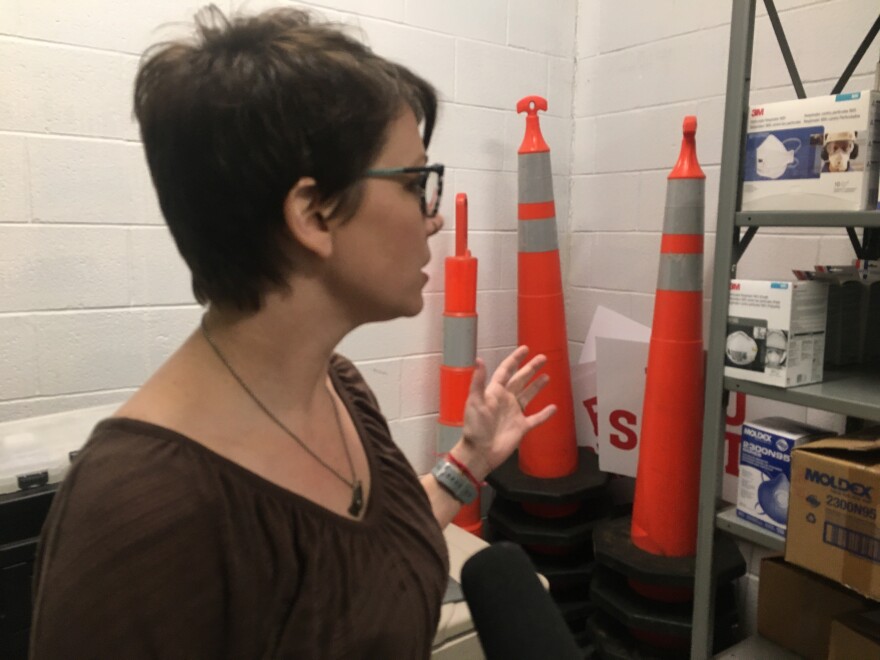Remote rural towns are a good place to be early in a pandemic, according to epidemiologists, but that flips as the people in those towns begin to get sick.
Fredonia, Kansas, and other rural towns tend to be more spread out, lowering the chances that people are in close enough contact to catch the novel coronavirus.
“I always say it’s a hundred miles from anywhere,” quips Cassie Edson, with the Wilson County Health Department. “It’s a hundred miles from Wichita, a hundred miles to Joplin, a hundred miles to Tulsa.”
By definition, rural areas are removed from major seaports, airports and often even big highways, so it generally takes longer for new viruses to show up, but when they do, that distance can make treatment challenging.
Already isolated
Fredonia had an estimated population of 2,264 in 2018.
Destany Wheeler, director of the Wilson County health department, says all the miles of farm fields between Fredonia and the next big town are a plus right now.
“It gives us a little bit more time to prepare and to educate people on, especially, social distancing,” Wheeler says.
That is the practice of avoiding large crowds and close contact with others, which is recommended by the Centers for Disease Control and Prevention to slow the spread of COVID-19.

Social distancing can be easier in small towns without mass transit, long lines or dense crowds.
“I think it’s accurate that where you have more individuals you increase the likelihood of transmission of infections,” says Allison Aiello, a professor of social epidemiology at the University of North Carolina.
That said, no one believes rural communities will be permanently shielded from the spread of the coronavirus.
“I think it’s just a matter of time,” says Andy Pekosz, a professor of molecular microbiology and immunology at Johns Hopkins Bloomberg School of Public Health.
Most remote rural towns don’t get many outside visitors, but the people who live there often drive to larger cities for everything from work to medical treatment to a night on the town.
Pekosz says that unless containment efforts succeed beyond his expectations, it will be increasingly likely that rural residents will be exposed to the coronavirus on those trips.
“As case numbers increase, then, there's more of a likelihood of people moving from those urban areas to all sorts of other parts of the country,” says Pekosz. “And so, therefore, the rest (of the country) is really going to increase exponentially.”
The town that blocked the Spanish Flu
Alex Navarro, a medical historian at the University of Michigan, says Spanish Flu swept the entire country in 1918. There were a few notable exceptions, including Gunnison, Colorado.
“You have the story of a town that literally barricaded the roads and forced everyone who did come into town into quarantine,” says Navarro.
In fact, all of Gunnison County sealed itself off from the outside world for four months. It worked. At the height of the pandemic, the county recorded just two cases of the Spanish Flu, both in isolation.
Navarro says people keep asking him if a remote, little town could pull off the same trick today.
“It's a very highly qualified maybe. I mean, I think there's probably no doubt that it can work if it's done properly,” says Navarro. “You have to do it really early. You have to do it as strictly as possible, and it has to last long enough for community transmission outside of that area to end.”
It turned out that even the four-month shutdown in Gunnison wasn’t long enough. More than 100 people got sick, and several died when the city finally lifted its barricades.
A challenge for the local health system
In Fredonia, Kansas, Wheeler has planned for coronavirus by stockpiling masks and other supplies, but she fears that a local outbreak could be devastating.
Wilson County, like most rural communities, skews older than the national average. Additionally, Wheeler says residents are more likely to be smokers or have chronic health issues, increasing the likelihood of life-threatening cases of COVID-19.
Fredonia is fortunate to have a hospital in town, but it’s small with only 25 beds and one ventilator.
Edson says a serious outbreak could quickly overwhelm the local health system.
“If enough people need more hospitalization, well, they'll have to go elsewhere, and that’s a fact. It'll be challenging to everybody,” says Edson.
Frank Morris is a national correspondent and senior editor at KCUR 89.3. You can reach him on Twitter @FrankNewsman.





